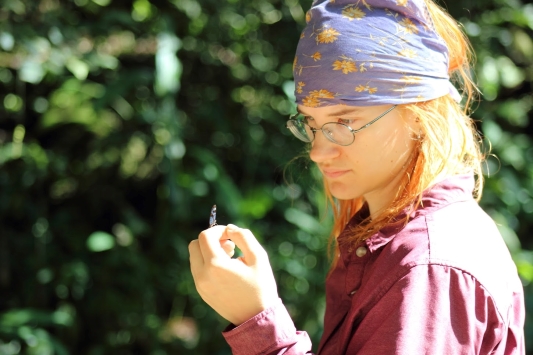Erana Taylor

Email: erana.taylor@usda.gov
Phone: (406) 542-4190
Fax: (406) 542-4196
Address:
790 East Beckwith Avenue
Missoula, Montana 59801
Education
Ph.D. Anthropology, 2021 -- University of Arizona (Tucson), Laboratory of Tree-Ring Research and Fire and Resilience Ecology Lab.
M.A. East Asian Studies -- University of Arizona (Tucson).
B.A. Asian Studies -- University of Oregon (Eugene) and Senshū University (Tokyo, Japan).
Background
Erana is a research ecologist studying climate change adaptation. With a background in fire ecology and dendrochronology, along with a special emphasis on systems where human-fire-animal relationships converge, Erana contributes an interdisciplinary perspective to the ALWRI team. For a Ph.D. dissertation at the University of Arizona (2021), Erana reconstructed almost 400 years of climate and fire history across the Southern Canadian Rocky Mountains to study how variations in land and fire management affected forests and their fire regimes differently across time and space. Erana has also studied pyric herbivory and carnivory, such as in the case of avian firespreading in Northern Australia, through both the lenses of science and the documentation of traditional ecological knowledge. Underlying all Erana’s research is the unifying goal of expanding perspective in science and land management theory. For example, in studying the shifting baselines phenomenon in Brazil, Erana found an urgent need for the collaboration of multiple disciplines to form longer ecological baselines that more accurately depict the scale of ongoing environmental degradation.
At ALWRI, Erana Erana analyzes climate change adaptation strategies and their potential ecological and social effects in response to climate change through a decision framework called “RAD.” The RAD framework uses scenario-based evaluations of risks, tradeoffs, and uncertainties in resisting (R), accepting (A), or directing (D) the effects of climate change in federally-designated wilderness areas. The Institute's RAD in Wilderness project aims to contribute understanding and tools for decision making in the wake of climate-change-driven ecosystem transformations while addressing the special circumstances of wilderness designation.
Publications and Presentations
Publications
TAYLOR, E., FALK, D., TOWNER, R. 2023. Traversing the Southern Canadian Rocky Mountains: A Least Cost Path Analysis Compared to Archaeological and Historical Records. Human Ecology 51(1). https://doi.org/10.1007/s10745-022-00386-6
MARGOLIS, E., GUITERMAN, C., CHAVARD `ES, R., COOP, J., COPES-GERBITZ, K., DAWE, D., ET AL. 2021. The North American Tree-Ring Fire-Scar Network. Ecosphere 13(7): e4159
DEWAR, J., FALK, D., SWETNAM, T., BAISAN, C., ALLEN, C., PARMENTER, R., MARGOLIS, E., TAYLOR, E. 2021. Valleys of fire: Historical fire regimes of forest-grassland ecotones across the montane landscape of the Valles Caldera National Preserve, New Mexico, USA. Landscape Ecology. 36(2):331-352.
BONTA, M., GOSFORD, R., EUSSEN, D., FERGUSON, N., LOVELESS, E., WITWER, M.
2017. Intentional Fire-Spreading By “Fire Hawk” Raptors in Northern Australia. Journal of Ethnobiology. 37(4):700-718
LOVELESS, E. Ethnoarchaeology Can Be Used for Ecological Conservation Because It Can Detect Shifting Baselines. Arizona Anthropologist. 28:51-65.
NASCIMENTO, L., LOVELESS, E., LIMA, F., G. F. 2014. Land Use Changes along the Border of Furna Feia National Park and its Buffer Zone. (Mudanc ̧as dos Usos da Terra numa ́Area Fronteiric ̧a entre o Parque Nacional da Furna Feia e sua Zona de Amortecimento.) In conference proceedings II Encontro Regional de Ecologia. Rio Tinto: UFPB, 2014(1):1-4.
Selected professional presentations
TAYLOR, E., FALK, D. 2022, 2021. Human Behavior and Climate Co-regulate Fire Synchrony and Its Spatial Clustering in Alberta’s Southern Canadian Rocky Mountains.
1. Guided poster. Session: ”Hazards, Risks, and Disasters (HRD) Emergent Papers.” American Association of Geographers (AAG) Annual Meeting. Virtual event. February 26, 2022.
2. Poster presentation. Association for Fire Ecology Fire Congress. Virtual event. December 2, 2021.
LOVELESS, E. Degrees of Climate Synchrony in a Complex Mountain Topography. Lightning talk. Laboratory of Tree-Ring Research, University of Arizona, Tucson. April 29, 2020.
LOVELESS, E., FALK, D. 2019. How Mountain Topography Shaped Forests by Influencing Human Fire Use. Guided poster. Session: “People and Wildfire.” American Association of Geographers (AAG) Annual Meeting, Washington D.C. April 4, 2019.
LOVELESS, E. The Bypass of Firebreaks by Avian Fire Spreading with Implications for Aboriginal vs. European Fire Management Styles. Paper presentation. Session: “Ethno-ornithology: advances in collaborative research.” 12th International Conference on Hunting and Gathering Societies (CHAGS 12). Universiti Sains Malaysia, Penang. July 26, 2018.
ORCID Profile
More information on Erana's research can be found through ORCID.